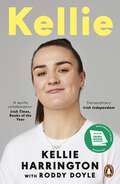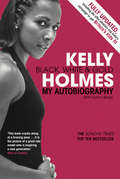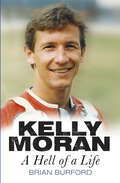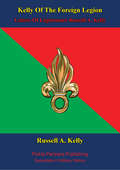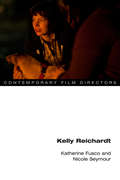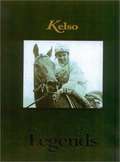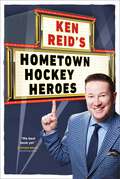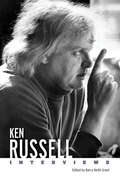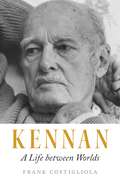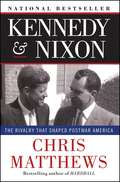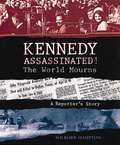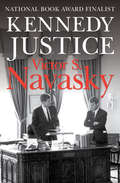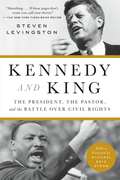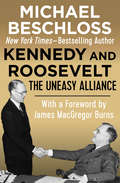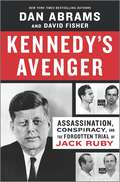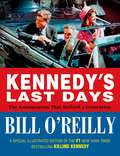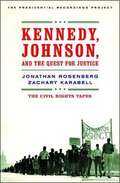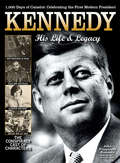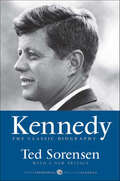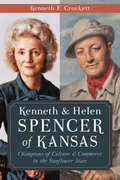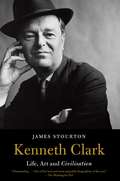- Table View
- List View
Kellie
by Roddy Doyle Kellie HarringtonTHE PHENOMENAL MEMOIR OF A NATIONAL TREASUREAfter Kellie Harrington won gold at the Tokyo Olympics, the Irish public recognized her as not merely a sporting hero, but a deeply inspirational human being. Now, Kellie tells the story of her unlikely journey to the top, and of the many obstacles and setbacks she overcame along the way.Growing up in Dublin's north inner city, Kellie was in danger of going down the wrong path in life before she discovered boxing. The local boxing club was all-male and initially wouldn't let her join, but she persisted.She was not an overnight success. For years she struggled in international competition. At times she felt unsupported by the national boxing set-up. More than once she considered giving up the sport. But some spark of ambition and love for boxing kept her going, and gradually she made herself world class.Writing with Roddy Doyle, the award-winning author of The Commitments, Kellie tells the story of her unlikely rise to greatness and her continuing dedication to living a normal life - which has involved remaining an amateur boxer and keeping the job she loves, at a Dublin psychiatric hospital. She shares exceptionally vivid and revealing details about being a woman in a historically male sport, and about how she manages her body and her mind. It is a vastly inspiring look inside the life and psychology of a woman who is both brilliantly ordinary and utterly exceptional.
Kelly Holmes: Black, White & Gold - My Autobiography
by Kelly HolmesKelly Holmes made history when she brought home double gold in the 2004 Olympics, becoming a national hero. She won Sports Personality of the Year, was given a Damehood, fully backed London's successful 2012 Olympic bid and became a superstar on the red carpet as well as a much acclaimed and consulted professional in the sporting world.Now in her staggeringly honest updated autobiography she reveals the times she fought back tears to battle against injury and win gold, plus the emotional decision she made to retire from athletics.Including details of her unsettled childhood, trials in the army and a struggle with self harm, Kelly's amazing determination carries through to make this inspirational and powerful autobiography a tale of triumph over adversity and a model for readers of all ages and backgrounds.
Kelly Moran: A Hell of a Life
by Brian BurfordThis is the book that speedway fans the world over have been waiting for: the inside story of the Californian hell-raiser, Kelly Moran.The charismatic American was one of the most spectacular and naturally talented riders to race speedway and very few share that incredible ability which ensured that he performed at the highest level for most of his career.A three-times World Finalist, double World Team Champion and US National Champion, Kelly’s talent as a racer took him around the world, while his exploits off the track have become legendary – making him one of the most popular riders ever.From leading the USA to world glory, via a near-death hotel accident, to joy-riding in a president’s bus, Brian Burford’s new book mixes the legendary tales of excess off the track with the success and popularity on the race circuit.With contributions from his family, friends and rivals, and written by one his closest friends, this book finally brings you the real story of Kelly Moran.
Kelly Of The Foreign Legion - Letters Of Légionnaire Russell A. Kelly
by Légionnaire Russell A. KellyThe French Army have had numerous foreign regiments in its service for centuries; however, few have the mystique and elite status of the French Foreign Legion. It became a haven for the rough, tough, and adventure-seeking crowds of all of Europe. Bred with a fierce and disciplined esprit de corps, these soldiers could expect to fight France's enemies even in the most desperate of circumstances.Like his American compatriot Henry Weston Farnsworth, Russell Kelly enlisted in the French Foreign Legion as soon as possible after the declaration of war was made and the start of the awful slaughter of the First World War began. After a scant two months of training, Kelly recounts that he and his fellow soldiers were shipped off to the Front. Within a mere three months, his letters tell of the vicious and confused fighting that he was involved in around Bouzy and then in the Arras sector. He and his unit were heavily engaged during the battle of Artois and after a short spell of rest and recruitment were back in the frontlines near Souchez, where Legionnaire Kelly met his end.These letters were thought of such quality and interest that they were published in the New York Evening Sun.
Kelly Reichardt
by Nicole Seymour Katherine FuscoKelly Reichardt's 1994 debut River of Grass established her gift for a slow-paced realism that emphasizes the ongoing, everyday nature of emergency. Her work since then has communed with--yet remained apart from--postwar European realisms, the American avant-garde, independent film, and the emerging slow cinema movement. Katherine Fusco and Nicole Seymour read such Reichardt films as Wendy and Lucy and Night Moves to consider the root that emergency shares with emergence --the slowly unfolding or the barely perceptible. They see Reichardt as a filmmaker preoccupied with how environmental and economic crises affect those living on society's fringes. Her spare plots and slow editing reveal an artist who recognizes that disasters are gradual, with effects experienced through duration rather than sudden shock. Insightful and boldly argued, Kelly Reichardt is a long overdue portrait of a filmmaker who sees emergency not as a break from the everyday, but as a version of it.
Kelso (Thoroughbred Legends #21)
by Steve HaskinNo racehorse of modern times was so good for so long. Racing until the age of nine, Kelso won thirty-nine of sixty-three races. This superstar of the 1960s earned an unprecedented five Horse of the Year titles, five divisional championships, set or equaled eight track records, and set three American standards. Much like Seabiscuit thirty years earlier, Kelso kept getting better as he got older, earning legions of fans with every passing year.
Ken Reid's Hometown Hockey Heroes
by Ken ReidFrom Sportsnet Central host and broadcaster Ken Reid comes an inspiring and entertaining new collection of hockey stories about local legends who define the game and its values. In many communities across Canada, hockey lives in the nearby arenas and leagues that forge both decades-long rivalries and unbreakable friendships. Fans show up to cheer not for distant NHL superstars, but for the homegrown heroes who define their town. These players don&’t always make it to the big leagues, but they inevitably become legends. In this entertaining collection, Canadian broadcaster and Sportsnet Central host Ken Reid tells their uplifting stories, from Pictou, Nova Scotia, to Kimberley, British Columbia—and everywhere in between. There&’s Robbie Forbes, who arrived in Newfoundland in the mid-eighties still dreaming of the pros and ended up giving the town a dream of its own when he led the Corner Brook Royals to a Canadian Senior Hockey title. He also happens to be Sidney Crosby&’s uncle. In a legendary Ontario community, the name Paul Polillo is spoken in the same reverential breath as Wayne Gretzky in their shared hometown of Brantford. There&’s also the tragic story of George Pelawa, who may have been the inspiration for Tom Cochrane & Red Rider&’s famous song &“Big League.&” And Tyson Wuttunee, an Indigenous player in Saskatchewan who, through hockey, found the family and home he&’d always longed for. Featuring heartwarming stories of grit, leadership, and lifelong bonds, Ken Reid&’s Hometown Hockey Heroes celebrates how hockey, and the values the game teaches, can shape our communities for the better.
Ken Russell: Interviews (Conversations with Filmmakers Series)
by Barry Keith GrantIn the 1970s, British filmmaker Ken Russell (1927–2011) quickly gained a reputation as the enfant terrible of British cinema. His work, like the man himself, was regarded as flamboyant, excessive, and unrestrained. Inheriting and yet subverting the venerable mantle of British documentary, Russell did not fit comfortably in the context of a national cinema dominated by sober realism. His distinct style combined realism with fictional devices, often in audacious ways, to create the biographical “docudrama.” In Ken Russell: Interviews, the filmmaker discusses his colorful life and career, from his youth fascinated by movies to his early work in television through his feature films and his retreat to home movies.Russell first drew notice in the early 1960s for a series of unorthodox biographical films about artists and composers. In these early television films, Russell was already exhibiting an unconventional approach to biography that combined historical fact, aesthetic interpretation, and outlandish personal vision. After the critical and commercial success of his adaptation of D. H. Lawrence’s Women in Love, Russell continued to explore the related themes of art, sexuality, and music in The Music Lovers, The Boy Friend, Mahler, Tommy, and Lisztomania. His career foundered after Valentino, however, and he found it increasingly difficult to get funding. Toward the end of his career, Russell was restricted to making movies with his own equipment, using family and friends as actors, with virtually no budget.Throughout the ups and downs of his career, Russell alternately embraced and resented his characterization as an enfant terrible. While Russell’s comments are often meant to provoke and shock, he is articulate when discussing his films, his approach to cinema, music and composers, and, of course, his critics.
Kendal Netmaker: The Boy from Sweetgrass First Nation (Fountas & Pinnell Classroom, Guided Reading)
by Katrina NelsonNIMAC-sourced textbook. Team Player. As a kid, Kendal Netmaker loved sports more than anything. He dreamed of playing on a team, but for years, Kendal's dream seemed impossible. Thanks to his best friend's act of kindness, Kendal became a star—on and off the field.
Kennan: A Life between Worlds
by Frank CostigliolaA definitive biography of the U.S. diplomat and prize-winning historian George F. KennanThe diplomat and historian George F. Kennan (1904–2005) ranks as one of the most important figures in American foreign policy—and one of its most complex. Drawing on many previously untapped sources, Frank Costigliola’s authoritative biography offers a new picture of a man of extraordinary ability and ambition whose idea of containing the Soviet Union helped ignite the Cold War but who spent the next half century trying to extinguish it. Always prescient, Kennan in the 1990s warned that the eastward expansion of NATO would spur a new cold war with Russia.Even as Kennan championed rational realism in foreign policy, his personal and professional lives were marked by turmoil. And though he was widely respected and honored by presidents and the public, he judged his career a failure because he had been dropped as a pilot of U.S. foreign policy. Impossible to classify, Kennan was a sui generis thinker, a trenchant critic of both communism and capitalism, and a pioneering environmentalist. Living between Russia and the United States, he witnessed firsthand Stalin’s tightening grip on the Soviet Union, the collapse of Europe during World War II, and the nuclear arms race of the Cold War.An absorbing portrait of an eloquent, insightful, and sometimes blinkered iconoclast whose ideas are still powerfully relevant, Kennan invites us to imagine a world that Kennan fought for but was unable to bring about—one not of confrontations and crises but of dialogue and diplomacy.
Kennedy & Nixon
by Christopher J MatthewsJohn F. Kennedy and Richard Nixon each dreamed of becoming the great young leader of their age. First as friends, then as bitter enemies, they were linked by a historic rivalry that changed both them and their country. In this startling dual portrait, Chris Matthews shows how the contest between the charismatic Kennedy and the talented yet haunted Nixon propelled America toward Vietnam and Watergate. Fresh, entertaining, and revealing, Kennedy and Nixon shows how the early fondness between the two men--Kennedy, for example, told a trusted friend that if he didn't receive the Democratic nomination in 1960, he would vote for Nixon--degenerated into distrust and bitterness. Using White House tapes, this book shows how Richard Nixon's dread of a Kennedy "restoration" in 1972 drove the dark deeds of Watergate.
Kennedy Assassinated! The World Mourns: A Reporter's Story
by Wilborn HamptonA reporter's view of the Kennedy assassination, with a detailed chronicle of that day's events
Kennedy Justice
by Victor S. NavaskyFinalist for the National Book Award: A groundbreaking portrait of the intersection of law and politics in Robert F. Kennedy&’s Department of JusticeAs United States Attorney General, the young, legally inexperienced Robert F. Kennedy sat at the head of a vast department tasked with enforcing the law and defending the rights of an entire nation. Although his family connection to the White House raised eyebrows, Robert Kennedy&’s tenure was marked by impassioned battles to root out corruption and protect individual civil liberties. From his fierce stand against organized crime to his tumultuous relationship with FBI director J. Edgar Hoover, RFK proved time and again that he was a champion of fairness.In this investigative account of the Kennedy years, acclaimed scholar Victor S. Navasky crafts an unmatched portrait of the complex interaction of power and principle in the halls of justice.
Kennedy Justice
by Victor S. NavaskyFinalist for the National Book Award: A groundbreaking portrait of the intersection of law and politics in Robert F. Kennedy&’s Department of JusticeAs United States Attorney General, the young, legally inexperienced Robert F. Kennedy sat at the head of a vast department tasked with enforcing the law and defending the rights of an entire nation. Although his family connection to the White House raised eyebrows, Robert Kennedy&’s tenure was marked by impassioned battles to root out corruption and protect individual civil liberties. From his fierce stand against organized crime to his tumultuous relationship with FBI director J. Edgar Hoover, RFK proved time and again that he was a champion of fairness.In this investigative account of the Kennedy years, acclaimed scholar Victor S. Navasky crafts an unmatched portrait of the complex interaction of power and principle in the halls of justice.
Kennedy and King: The President, the Pastor, and the Battle over Civil Rights
by Steven Levingston"Kennedy and King is an unqualified masterpiece of historical narrative.... A landmark achievement."---Douglas Brinkley, New York Times bestselling author of Rosa Parks "By reminding us of these great leaders and their accomplishments, this book will fuel your passion for the new work we still need to do in our society today."---Congressman John Lewis Kennedy and King traces the emergence of two of the twentieth century's greatest leaders, their powerful impact on each other and on the shape of the civil rights battle between 1960 and 1963. These two men from starkly different worlds profoundly influenced each other's personal development. Kennedy's hesitation on civil rights spurred King to greater acts of courage, and King inspired Kennedy to finally make a moral commitment to equality. As America still grapples with the legacy of slavery and the persistence of discrimination, Kennedy and King is a vital, vivid contribution to the literature of the Civil Rights Movement.
Kennedy and Roosevelt: The Uneasy Alliance
by Michael BeschlossStory of the relationship between Joseph Kennedy and FDR.
Kennedy and Roosevelt: The Uneasy Alliance
by Michael BeschlossThe revealing story of Franklin Roosevelt, Joe Kennedy, and a political alliance that changed history, from a New York Times–bestselling author. When Franklin Roosevelt ran for president in 1932, he gained the support of Joseph Kennedy, a little-known businessman with Wall Street connections. Instrumental in Roosevelt&’s victory, their partnership began a longstanding alliance between two of America&’s most ambitious power brokers. Kennedy worked closely with FDR as the first chairman of the Securities and Exchange Commission, and later as ambassador to Great Britain. But at the outbreak of World War II, sensing a threat to his family and fortune, Kennedy lobbied against American intervention—putting him in direct conflict with Roosevelt&’s intentions. Though he retreated from the spotlight to focus on the political careers of his sons, Kennedy&’s relationship with Roosevelt would eventually come full circle in 1960, when Franklin Roosevelt Jr. campaigned for John F. Kennedy&’s presidential win. With unprecedented access to Kennedy&’s private diaries as well as firsthand interviews with Roosevelt&’s family and White House aides, New York Times–bestselling author Michael Beschloss—called &“the nation&’s leading presidential historian&” by Newsweek—presents an insightful study in contrasts. Roosevelt, the scion of a political dynasty, had a genius for the machinery of government; Kennedy, who built his own fortune, was a political outsider determined to build a dynasty of his own. From the author of The Conquerors and Presidential Courage, this is a &“fascinating account of the complex, ambiguous relationship of two shrewd, ruthless, power-hungry men&” (The New York Times Book Review).
Kennedy's Avenger: Assassination, Conspiracy, and the Forgotten Trial of Jack Ruby
by David Fisher Dan AbramsNew York Times bestselling authors Dan Abrams and David Fisher bring to life the incredible story of one of America’s most publicized—and most surprising—criminal trials in history.No crime in history had more eyewitnesses. On November 24, 1963, two days after the killing of President Kennedy, a troubled nightclub owner named Jack Ruby quietly slipped into the Dallas police station and assassinated the assassin, Lee Harvey Oswald. Millions of Americans witnessed the killing on live television, and yet the event would lead to questions for years to come.It also would help to spark the conspiracy theories that have continued to resonate today.Under the long shadow cast by the assassination of America’s beloved president, few would remember the bizarre trial that followed three months later in Dallas, Texas. How exactly does one defend a man who was seen pulling the trigger in front of millions? And, more important, how did Jack Ruby, who fired point-blank into Oswald live on television, die an innocent man?Featuring a colorful cast of characters, including the nation’s most flamboyant lawyer pitted against a tough-as-Texas prosecutor, award-winning authors Dan Abrams and David Fisher unveil the astonishing details behind the first major trial of the television century. While it was Jack Ruby who appeared before the jury, it was also the city of Dallas and the American legal system being judged by the world.
Kennedy's Last Days: The Assassination That Defined A Generation
by Bill O'ReillyOn a sunny day in Dallas, Texas, at the end of a campaign trip, President John Fitzgerald Kennedy is assassinated by an angry, lonely drifter named Lee Harvey Oswald. The former Marine Corps sharpshooter escapes briefly, but is hunted down, captured, and then shot dead while in police custody. Kennedy's Last Days is a gripping account of the events leading up to the most notorious crime of the twentieth century Author Bill O'Reilly vividly describes the Kennedy family's life in the public eye, the crises facing the president around the world and at home, the nation's growing fascination with their vigorous, youthful president, and finally, the shocking events leading up to his demise. Adapted from Bill O'Reilly's best-selling historical thriller Killing Kennedy, with an unforgettable cast of characters, page-turning action, and art on every spread, Kennedy's Last Days is history that reads like a thriller. This exciting book will captivate adults and young readers alike
Kennedy, Johnson, and the Quest for Justice: The Civil Rights Tapes
by Jonathan Rosenberg Zachary KarabellThe story of the passage of the Civil Right Legislation of 1964, with emphasis on new information provided by the recently released tapes of Kennedy and Johnson.
Kennedy: His Life and Legacy
by Ben NussbaumCommemorating the fiftieth anniversary of the untimely death of America's most popular president, Kennedy: His Life & Legacy is a candid look at the charisma and excitement that captured the nation during John F. Kennedy's one thousand days of Camelot. <P><P>Editor Ben Nussbaum has compiled a collection of riveting chapters that discuss the influence and money of the Kennedy clan, the politics and unique circumstances that led to JFK's election, his presidency, his family, and his assassination. The book convincingly debunks the major conspiracy theories that mushroomed on our nation's darkest day, when the much-loved young president was violently slain in the streets of Dallas, Texas. Concise and colorful, this 96-page book offers readers a snapshot of President John Fitzgerald Kennedy and a glimpse at what made Americans fall in love with the thirty-fifth president during a time not only of great population and economic growth but also of pressing international conflicts with Vietnam, the U.S.S.R., and Cuba. Over five decades since JFK's election, he remains the most highly rated President, according to a Gallup poll; during his brief presidency, his approval rating of 70.1 was the highest of any post-World War II chief executive.A handsome young Boston native, from one of America's wealthiest and most influential families, JFK declared on the day of his inauguration that the country was now "a new generation of Americans," and citizens responded enthusiastically to the new president's positive outlook, charisma, and confidence. By 1960, the United States of America had emerged as the world's only superpower, and JFK, as the first president born in the twentieth century, represented hope, prosperity, and strength to the world at large. He used the country's new popular medium-television-to his great advantage, appearing in ninety percent of the country's living room as a charming, well-educated, worldly world leader. The book presents JFK as the nation's first Hollywood president-a celebrity who braced the nation for changes and challenges of the New Frontier, encouraging Americans to dream about stars, far-off planets, and a moon that an American would soon be the first to walk upon.In Kennedy, His Life & Legacy, Nussbaum presents John F. Kennedy, our youngest president-forty-three upon his inauguration-as a U.S. Navy war hero, the inspired author of Profiles in Courage, and a talented, thoughtful statesman and then demystifies the hero by showing how he used his charisma and power to downplay his youth and inexperience, his lackluster performance in Congress, and his unattractive Catholicism. Kennedy did well, too, to hide his dark side-his years as a rash and wild womanizer, his poor health, and the elitism that stemmed from his family's virtually limitless wealth. The book unapologetically recounts JFK's playboy escapades, taking place before and during his presidency-in the Oval Office, the Lincoln bedroom, and the White House pool.
Kennedy: The Classic Biography
by Ted Sorensen“A brilliant and essential document about the man, the President, and his times. In all the millions of words which have been written about the martyred President, this book must remain unique. . . . It is John F. Kennedy’s life, his personality, his thinking which informed his action and that action itself described with honest and candor which illuminate and enliven the crowded pages of this book. Sorensen has managed to portray Kennedy in realistic human terms and not as the hero of a myth. . . . It is the richness of detail, anecdotes, incidents, conversations, descriptions rather than any gossip or startling revelations which gives the book its compelling readability.” — Los Angeles TimesThe classic, intimate, and #1 national bestselling biography of JFK by his great advisor Ted Sorensen.In January 1953, freshman senator John F. Kennedy of Massachusetts hired a twenty-four-year-old from Nebraska as his Number Two legislative assistant—on a trial basis. Despite the differences in their backgrounds, in the eleven years that followed Ted Sorensen became known as Kennedy's intellectual blood bank, top policy aide, and alter ego.Sorensen knew Kennedy the man, the senator, the candidate, and the president as no other associate did. From his role as a legislative assistant to Kennedy's death in 1963, Sorensen was with him during the key crises and turning points—including the spectacular race for the vice presidency at the 1956 convention, the launching of Kennedy's presidential candidacy, the TV debates with Nixon, and election night at Hyannis Port. The first appointment made by the new president was to name Ted Sorensen his Special Counsel.In Kennedy, Sorensen recounts failures as well as successes with surprising candor and objectivity. He reveals Kennedy's errors on the Bay of Pigs, and his attitudes toward the press, Congress, and the Joint Chiefs of Staff. Sorensen saw firsthand Kennedy's actions in the Cuban missile crisis, and the evolution of his beliefs on civil rights and arms control. First published in 1965 and reissued here with a new preface, Kennedy is an intimate biography of an extraordinary man, and one of the most important historical accounts of the twentieth century.
Kenneth & Helen Spencer of Kansas: Champions of Culture & Commerce in the Sunflower State
by Kenneth F. CrockettBorn on opposite sides of the Kansas/Missouri border in 1902, Kenneth Aldred Spencer and his wife, Helen Foresman Spencer, were transformative figures in the Midwest during the twentieth century. Kenneth grew up in the small town of Pittsburg, Kansas, but by the 1950s, his innovation in the chemical and coal industries had earned him mention in "Forbes" magazine for his role as one of the nation's great industrialists. But it is the couple's remarkable philanthropic work that stands as their true legacy, preserved in places like the Kenneth Spencer Research Library and the Helen Foresman Spencer Museum of Art..
Kenneth Clark: Life, Art and Civilisation
by James StourtonThe definitive biography of this brilliant polymath--director of the National Gallery, author, patron of the arts, social lion, and singular pioneer of television--that also tells the story of the arts in the twentieth century through his astonishing life. Kenneth Clark's thirteen-part 1969 television series, Civilisation, established him as a globally admired figure. Clark was prescient in making this series: the upheavals of the century, the Cold War among others, convinced him of the power of barbarism and the fragility of culture. He would burnish his image with two memoirs that artfully omitted the more complicated details of his life. Now, drawing on a vast, previously unseen archive, James Stourton reveals the formidable intellect and the private man behind the figure who effortlessly dominated the art world for more than half a century: his privileged upbringing, his interest in art history beginning at Oxford, his remarkable early successes. At 27 he was keeper of Western Art at the Ashmolean in Oxford and at 29, the youngest director of The National Gallery. During the war he arranged for its entire collection to be hidden in slate mines in Wales and organized packed concerts of classical music at the Gallery to keep up the spirits of Londoners during the bombing. WWII helped shape his belief that art should be brought to the widest audience, a social and moral position that would inform the rest of his career. Television became a means for this message when he was appointed the first chairman of the Independent Television Authority. Stourton reveals the tortuous state of his marriage during and after the war, his wife's alcoholism, and the aspects of his own nature that he worked to keep hidden. A superb work of biography, Kenneth Clark is a revelation of its remarkable subject.
Kenneth Clark: Life, Art and Civilisation
by James StourtonThe definitive biography of this brilliant polymath--director of the National Gallery, author, patron of the arts, social lion, and singular pioneer of television--that also tells the story of the arts in the twentieth century through his astonishing life. Kenneth Clark's thirteen-part 1969 television series, Civilisation, established him as a globally admired figure. Clark was prescient in making this series: the upheavals of the century, the Cold War among others, convinced him of the power of barbarism and the fragility of culture. He would burnish his image with two memoirs that artfully omitted the more complicated details of his life. Now, drawing on a vast, previously unseen archive, James Stourton reveals the formidable intellect and the private man behind the figure who effortlessly dominated the art world for more than half a century: his privileged upbringing, his interest in art history beginning at Oxford, his remarkable early successes. At 27 he was keeper of Western Art at the Ashmolean in Oxford and at 29, the youngest director of The National Gallery. During the war he arranged for its entire collection to be hidden in slate mines in Wales and organized packed concerts of classical music at the Gallery to keep up the spirits of Londoners during the bombing. WWII helped shape his belief that art should be brought to the widest audience, a social and moral position that would inform the rest of his career. Television became a means for this message when he was appointed the first chairman of the Independent Television Authority. Stourton reveals the tortuous state of his marriage during and after the war, his wife's alcoholism, and the aspects of his own nature that he worked to keep hidden. A superb work of biography, Kenneth Clark is a revelation of its remarkable subject.From the Hardcover edition.
